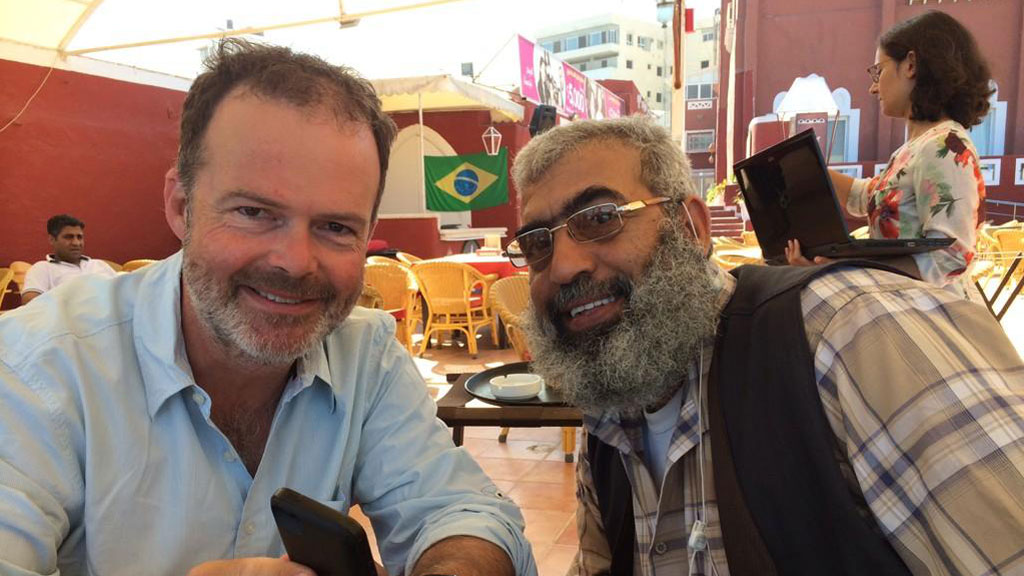Why Khaled Abu Ghali won the Martin Adler prize
Early on Sunday 20th July, we clambered wearily into the back of our ancient stretch-Mercedes taxi and headed east, into the low, but already searing morning sun.
Sweating into our body armour and wearing our helmets in the car, we drove in silence through ghostly streets towards Shajaiyah. The district, on the outer edge of Gaza City, had been under apocalyptic bombardment all night; we’d watched from a distance as hell rained down on a residential suburb.

As dawn broke, families trapped by the unremitting rocket-fire, were escaping down Shajaiyah’s narrow alleyways. Children were in shock, eyes wide. Their parents talked of bloodied bodies littering the rubble-strewn streets they’d fled. Another shell exploded just nearby. A little girl we’d stopped to talk to said she wasn’t scared, but her father told me he was petrified.
‘Stop. It isn’t safe.’
More rockets crashed down behind the fleeing Shajaiyah refugees as we cautiously headed in. Our guide, as ever: Khaled Abu Ghali, my friend and freelance fixer for close to a decade now. When you work with someone long enough in such conditions you build a bond of trust of the sort that lasts a lifetime. Stephen, my cameraman, Anna-Lisa, my producer and I were, quite simply, in his hands. We turned left, we turned right, down Friday Market Street. Khaled spoke to a couple of people, then beckoned us to follow. We filmed as we walked.
A few minutes later and Stephen’s camera catches a moment I still remember vividly. Khaled has suddenly stopped in his tracks. The two of us had been pacing up an alleyway towards a destroyed house. Now his blue flak jacket blocks the camera. “No,” he said. “Stop. It isn’t safe.”
I stopped and turned. “What’s up?”
“I don’t know. We just should not go up here,” Khaled said.
“OK.” I looked at him quizzically, but I’d learned to trust his judgment.
It’s all there, caught on camera. We turned and left and as we did so, small-arms fire broke out up the alley. It meant that Hamas street fighters were probably engaging Israeli snipers just nearby. I looked at Khaled, who grinned at me and shrugged. “You see? Let’s go!” he said, “al-hamdulillah!” Thank God.
Sixth sense
This was not the only time Khaled Abu Ghali’s sixth sense kicked in and saved us. We weren’t the only Channel 4 News crew that long, hot, dangerous Gaza summer, to have praised Khaled’s cool-headedness under fire. He has worked with different crews through the wars of 2006, 2009, 2012 and 2014; and this year alone, he worked with five successive teams without a break, flat out for weeks.
He continued to so even when his own wife and children were forced to evacuate their family home, when his married daughter’s home was partially destroyed and when a close friend was killed in an Israeli air-strike. He just kept on, relentlessly; our Gaza field producer; shepherding, fixing, translating… and helping to coordinate out Channel 4 News live broadcasts from Shifa Hospital.
This is why these teams of presenters, correspondents, producers and cameramen have unanimously nominated Khaled Abu Ghali for this year’s Martin Adler Prize, which recognises the critical role played by freelance fixers, as part of the Rory Peck Awards. In doing so, we pay tribute to his professionalism, indefatigably, his coolness in difficult and dangerous situations and to his infectious, mischievous sense of humour.
Khaled is a big man in every way: big beard, big heart, big laugh. He has a way with children in particular; he makes even the seemingly inconsolable laugh with his ludicrous party tricks, as he comforts their parents after they’ve relayed their grim experiences to our cameras.
Martin Adler
Shortly after I first met and worked with Khaled, a film-maker friend of mine – with whom I’d made many reports broadcast for Channel 4 News – was shot dead while working in Somalia. Typically, he’d been in the thick of things, at a protest, always striving for the perfect pictures. My friend’s name was Martin Adler.
The prize named after him was set up to honour fixers because that was Martin’s speciality. He quietly looked after freelancers he’d shared adventures with in far-flung places; rumour has it he bankrolled a wedding somewhere in Central Asia and put a child through school in South America. He taught his freelance colleagues around the world the things he knew, encouraged them, helped them financially when that was needed and he stayed in touch.
For Khaled Abu Ghali to win the prize named after Martin Adler has a powerful resonance for me. Two friends. One, tragically dead before his time; one very much alive. Khaled and Martin never met. I wish they had. I know that had they done so, they’d have had a powerful chemistry and would have loved to have worked together.
The Rory Peck Awards are uniquely dedicated to the work of freelance cameramen and camerawomen in news and current affairs. The awards honour camerawork but also take into account journalistic ability and individual endeavour.
Follow @millerc4 on Twitter
